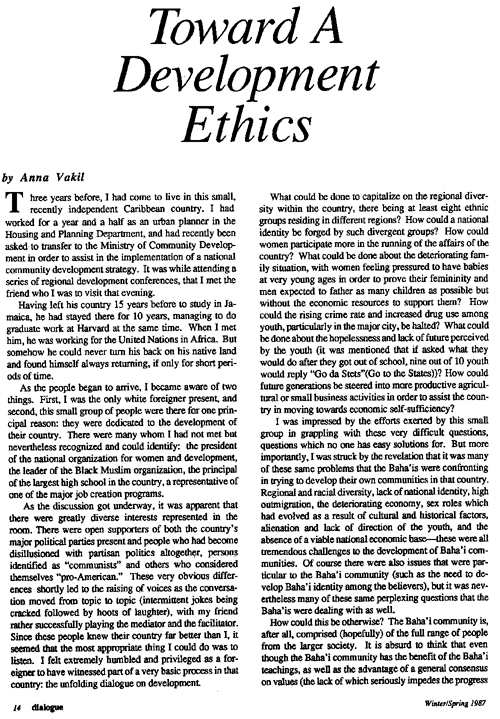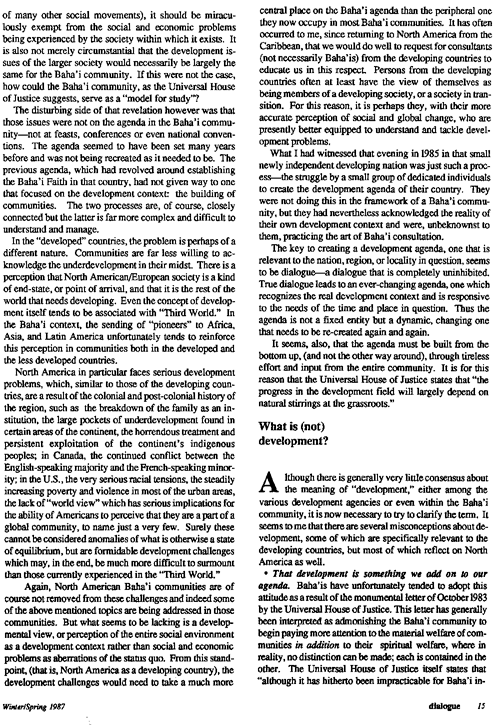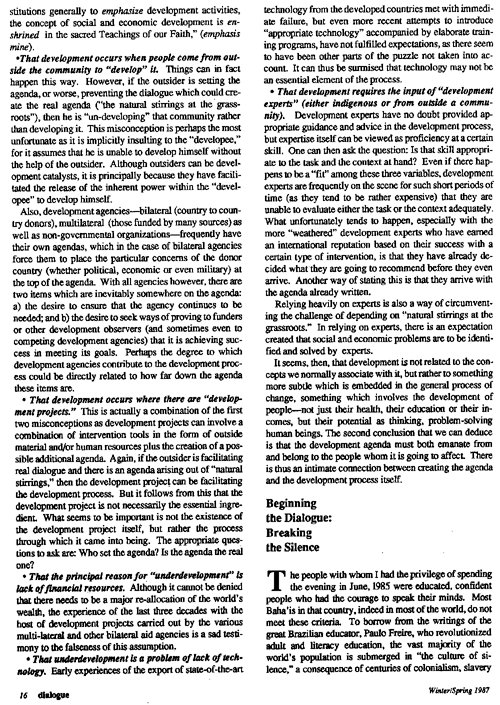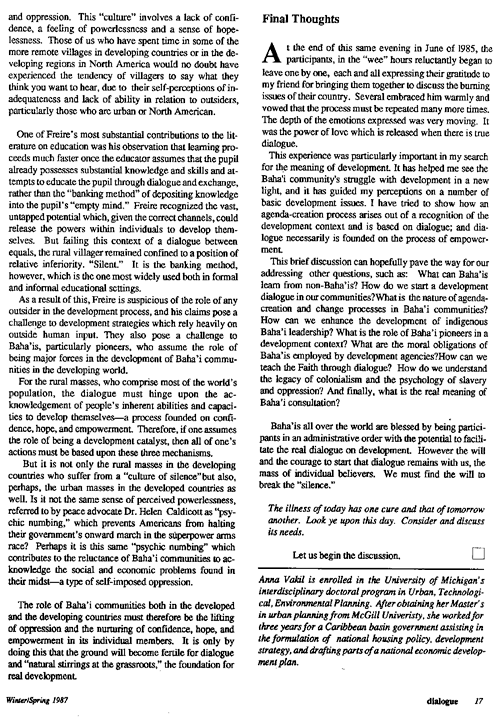
|
|
Abstract: Development issues from a North American perspective, informed by time spent pioneering in the Caribbean and the writings of Paulo Freire, and how to bring such issues to the attention of the Bahá'í community. Notes: See also list of dialogue articles or image scans. |
Toward a Development Ethics
by Anna C. Vakil
published in dialogue, 1:4, pages 14-17Los Angeles: 1987
Having left his country 15 years before to study in Jamaica, he had stayed there for 10 years, managing to do graduate work at Harvard at the same time. When I met him, he was working for the United Nations in Africa. But somehow he could never turn his back on his native land and found himself always returning, if only for short periods of time.
As the people began to arrive, I became aware of two things. First, I was the only white foreigner present, and second, this small group of people were there for one principal reason: they were dedicated to the development of their country. There were many whom I had not met but nevertheless recognized and could identify: the president of the national organization for women and development, the leader of the Black Muslim organization, the principal of the largest high school in the country, a representative of one of the major job creation programs.
As the discussion got underway, it was apparent that there were greatly diverse interests represented in the room. There were open supporters of both the country’s major political parties present and people who had become disillusioned with partisan politics altogether, persons identified as “communists” and others who considered themselves “pro-American.” These very obvious differences shortly led to the raising of voices as the conversation moved from topic to topic (intermittent jokes being cracked followed by hoots of laughter), with my friend rather successfully playing the mediator and the facilitator. Since these people knew their country far better than I, it seemed that the most appropriate thing I could do was to listen. I felt extremely humbled and privileged as a foreigner to have witnessed part of a very basic process in that country: the unfolding dialogue on development.
What could be done to capitalize on the regional diversity within the country, there being at least eight ethnic groups residing in different regions? How could a national identity be forged by such divergent groups? How could women participate more in the running of the affairs of the country? What could be done about the deteriorating family situation, with women feeling pressured to have babies at very young ages in order to prove their femininity and men expected to father as many children as possible but without the economic resources to support them? How could the rising crime rate and increased drug use among youth, particularly in the major city, be halted? What could be done about the hopelessness and lack of future perceived by the youth (it was mentioned that if asked what they would do after they got out of school, nine out 10 youth would reply “Go da Stets” [Go to the States])? How could future generations be steered into more productive agriculture or small business activities in order to assist the country in moving towards economic self-sufficiency?
I was impressed by the efforts exerted by this small group in grappling with these very difficult questions, questions which no one has easy solutions for. But more importantly, I was struck by the revelation that it was many of these same problems that the Bahá'ís were confronting in trying to develop their own communities in that country. Regional and racial diversity, lack of national identity, high outmigration, the deteriorating economy, sex roles which had evolved as a result of cultural and historical factors, alienation and lack of direction of the youth, and the absence of a viable national economic base — these were all tremendous challenges to the development of Bahá'í communities. Of course there were also issues that were particular to the Bahá'í community (such as the need to develop Bahá'í identity among the believers), but it was nevertheless many of these same perplexing questions that the Bahá'í were dealing with as well.
How could this be otherwise? The Bahá'í community is, after all, comprised (hopefully) of the full range of people from the large society. It is absurd to think that even though the Bahá'í community has the benefit of the Bahá'í teachings, as well as the advantage of a general consensus on values (the lack of which seriously impedes the progress of many other social movements), it should be miraculously exempt from the social and economic problems being experienced by the society within which it exists. It is also not merely circumstantial that the development issues of the larger society would necessarily be largely the same for the Bahá'í community. If this were not the case, how could the Bahá'í community, as the Universal House of Justice suggests, serve as a “model for study”?
The disturbing side of that revelation however was that those issues were not on the agenda in the Bahá'í community — not at feasts, conferences or even national conventions. The agenda seemed to have been set many years before and was not being recreated as it needed to be. The previous agenda, which had revolved around establishing the Bahá'í Faith in that country, had not given way to one that focused on the development context: the building of communities. The two processes are, of course, closely connected but the latter is far more complex and difficult to understand and manage.
In the “developed” countries, the problem is perhaps of a different nature. Communities are far less willing to acknowledge the underdevelopment in their midst. There is a perception that North American/European society is a kind of end-state, or point of arrival, and that it is the rest of the world that needs developing. Even the concept of development itself tends to be associated with “Third World.” In the Bahá'í context, the sending of “pioneers” to Africa, Asia, and Latin America unfortunately tends to reinforce this perception in communities both in the developed and the less developed countries.
North America in particular faces serious development problems, which, similar to those of the developing countries, are a result of the colonial and post-colonial history of the region, such as the breakdown of the family as an institution, the large pockets of underdevelopment found in certain areas of the continent, the horrendous treatment and persistent exploitation of the continent’s indigenous peoples; in Canada, the continued conflict between the English-speaking majority and the French-speaking minority; in the U.S., the very serious racial tensions, the steadily increasing poverty and violence in most of the urban areas, the lack of “world view” which has serious implications for the ability of Americans to perceive that they are a part of a global community, to name just a few. Surely these cannot be considered anomalies of what is otherwise a state of equilibrium, but are formidable development challenges which may, in the end, be much more difficult to surmount than those currently experienced in the “Third World.”
Again, North American Bahá'í communities are of course not removed from these challenges and indeed some of the above mentioned topics are being addressed in those communities. But what seems to be lacking is a developmental view, or perception of the entire social environment as a developmental context rather than social and economic problems as aberrations of a status quo. From this standpoint (that is, North America as a developing country), the development challenges would need to take a much more central place on the Bahá'í agenda than the peripheral one they now occupy in most Bahá'í communities. It has often occurred to me, since returning to North America from the Caribbean, that we would do well to request for consultants (not necessarily Bahá'ís) from the developing countries to educate us in this respect. Persons from the developing countries often at least have the view of themselves as being members of a developing society, or a society in transition. For this reason, it is perhaps they, with their more accurate perception of social and global change, who are presently better equipped to understand and tackle development problems.
What I had witnessed that evening in 1985 in that small newly independent developing nation was just such a process — the struggle by a small group of dedicated individuals to create the development agenda of their country. They were not doing this in the framework of a Bahá'í community, but they had nevertheless acknowledged the reality of their own development context and were, unbeknownst to them, practicing the art of Bahá'í consultation.
The key to creating a development agenda, one that is relevant to the nation, region, or locality in question, seems to be dialogue — a dialogue that is completely uninhibited. True dialogue leads to an ever-changing agenda, one which recognizes the real development context and is responsive to the needs of the time and place in question. Thus the agenda is not a fixed entity but a dynamic, changing one that needs to be re-created again and again.
It seems, also, that the agenda must be built from the bottom up, (and not the other way around), through tireless effort and input from the entire community. It is for this reason that the Universal House of Justice states that “the progress in the development field will largely depend on natural stirrings at the grassroots.”
WHAT IS (NOT) DEVELOPMENT?
Although there is generally very little consensus about the meaning of “development,” either among the various development agencies or even with the Bahá'í community, it is now necessary to try to clarify the term. It seems to me that there are several misconceptions about development, some of which are specifically relevant to the developing countries, but most of which reflect on North America as well.
- That development is something we add on to our agenda. Bahá'ís have unfortunately tended to adopt this attitude as a result of the monumental letter of October 1983 by the Universal House of Justice. This letter has generally been interpreted as admonishing the Bahá'í community to begin paying more attention to the material welfare of communities in addition to their spiritual welfare, where in reality, no distinction can be made; each is contained in the other. The Universal House of Justice itself states that “although it has hitherto been impracticable for Bahá'í institutions generally to emphasize development activities, the concept of social and economic development is enshrined in the sacred Teachings of our Faith,” (emphasis mine).
- That development occurs when people come from outside the community to “develop” it. Things can in fact happen this way. However, if the outsider is setting the agenda, or worse, preventing the dialogue which could create the real agenda (“the natural stirrings at the grassroots”), then he is “un-developing” that community rather than developing it. This misconception is perhaps the most unfortunate as it is implicitly insulting to the “developee,” for it assumes that he is unable to develop himself without the help of the outsider. Although outsiders can be development catalysts, it is principally because they have facilitated the release of the inherent power within the “developee” to develop himself.
Also, development agencies — bilateral (country to country donors), multilateral (those funded by many sources) as well as non-governmental organizations — frequently have their own agendas, which in the case of bilateral agencies force them to place the particular concerns of the donor country (whether political, economic or even military) at the top of the agenda. With all agencies, however, there are two items which are inevitably somewhere on the agenda: a) the desire to ensure that the agency continues to be needed; and b) the desire to seek ways of proving to funders or other development observers (and sometimes even to competing development agencies) that it is achieving success in meeting its goals. Perhaps the degree to which development agencies contribute to the development process could be directly related to how far down the agenda these items are.
- That development occurs where there are “development projects.” This is actually a combination of the first two misconceptions as development projects can involve a combination of intervention tools in the form of outside material and/or human resources plus the creation of a possible additional agenda. Again, if the outsider is facilitating real dialogue and there is an agenda arising out of “natural stirrings,” then the development project can be facilitating the development process. But it follows from this that the development project is not necessarily the essential ingredient. What seems to be important is not the existence of the development project itself, but rather the process through which it came into being. The appropriate questions to ask are: Who set the agenda? Is the agenda the real one?
- That the principal reason for “underdevelopment” is lack of financial resources. Although it cannot be denied that there needs to be a major re-allocation of the world’s wealth, the experience of the last three decades with the host of development projects carried out by the various multi-lateral and other bilateral aid agencies is a sad testimony to the falseness of this assumption.
- That underdevelopment is a problem of lack of technology. Early experiences of the export of state-of-the-art technology from the developed countries met with immediate failure, but even more recent attempts to introduce “appropriate technology” accompanied by elaborate training programs, have not fulfilled expectations, as there seem to have been other parts of the puzzle not taken into account. It can thus be surmised that technology may not be an essential element of the process.
- That development requires the input of “development experts” (either indigenous or from outside a community). Development experts have no doubt provided appropriate guidance and advice in the development process, but expertise itself can be viewed as proficiency at a certain skill. One can then ask the question: Is that skill appropriate to the task and the context at hand? Even if there happens to be a “fit” among these three variables, development experts are frequently on the scene for such short periods of time (as they tend to be rather expensive) that they are unable to evaluate either the task or the context adequately. What unfortunately tends to happen, especially with the more “weathered” development experts who have earned an international reputation based on their success with a certain type of intervention, is that they have already decided what they are going to recommend before they even arrive. Another way of stating this is that they arrive with the agenda already written.
It seems, then, that development is not related to the concepts we normally associate with it, but rather to something more subtle which is embedded in the general process of change, something which involves the development of people — not just their health, their education or their incomes, but their potential as thinking, problem-solving human beings. The second conclusion that we can deduce is that the development agenda must both emanate from and belong to the people whom it is going to affect. There is thus an intimate connection between creating the agenda and the development process.
BEGINNING THE DIALOGUE: BREAKING THE SILENCE
The people with whom I had the privilege of spending the evening in June 1985 were educated, confident people who had the courage to speak their minds. Most Bahá'ís in that country, indeed in most of the world, do not meet these criteria. To borrow from the writings of the great Brazilian educator, Paulo Freire, who revolutionized adult and literacy education, the vast majority of the world’s population is submerged in “the culture of silence,” a consequence of centuries of colonialism, slavery and oppression. This “culture” involves a lack of confidence, a feeling of powerlessness and a sense of hopelessness. Those of us who have spent time in some of the more remote villages in developing countries or in the developing regions in North America would no doubt have experienced the tendency of villagers to say what they think you want to hear, due to their self-perceptions of inadequateness and lack of ability in relation to outsiders, particularly those who are urban or North American.
One of Freire’s most substantial contributions to the literature on education was his observation that learning proceeds much faster once the educator assumes that the pupil already possesses substantial knowledge and skills and attempts to educate the pupil through dialogue and exchange, rather than the “banking method” of depositing knowledge into the pupil’s “empty mind.” Freire recognized the vast, untapped potential which, given the correct channels, could release the powers within individuals to develop themselves. But failing this context of a dialogue between equals, the rural villager remained confined to a position of relative inferiority. “Silent.” It is the banking method, however, which is the one most widely used both in formal and informal educational settings.
As a result of this, Freire is suspicious of the role of any outsiders in the development process, and his claims pose a challenge to development strategies which rely heavily on outside human input. They also pose a challenge to Bahá'ís, particularly pioneers, who assume the role of being major forces in the development of Bahá'í communities in the developing world.
For the rural masses, who comprise most of the world’s population, the dialogue must hinge upon the acknowledgement of people’s inherent abilities and capacities to develop themselves — a process founded on confidence, hope, and empowerment. Therefore, if one assumes the role of being a development catalyst, then all of one’s actions must be based upon these three mechanisms.
But it is not only the rural masses in the developing countries who suffer from a “culture of silence” but also, perhaps, the urban masses in the developed countries as well. Is it not the same sense of perceived powerlessness, referred to by peace advocate Dr. Helen Caldicott as “psychic numbing,” which prevents Americans from halting their government’s onward march in the superpower arms race? Perhaps it is this same “psychic numbing” which contributes to the reluctance of Bahá'í communities to acknowledge the social and economic problems found in their midst — a type of self-imposed oppression.
The role of Bahá'í communities both in the developed and the developing countries must therefore be the lifting of oppression and the nurturing of confidence, hope, and empowerment in its individual members. It is only by doing this that the ground will become fertile for dialogue and “natural stirrings at the grassroots,” the foundation for real development.
FINAL THOUGHTS
At the end of this same evening in June of 1985, the participants, in the “wee” hours reluctantly began to leave one by one, each and all expressing their gratitude to my friend for bringing them together to discuss the burning issues of their country. Several embraced him warmly and vowed that the process must be repeated many more times. The depth of the emotions expressed was very moving. It was the power of love which is released when there is true dialogue.
This experience was particularly important in my search for the meaning of development. It has helped me see the Bahá'í community’s struggle with development in a new light, and it has guided my perceptions on a number of basic development issues. I have tried to show how an agenda-creation process arises out of a recognition of the development context and is based on dialogue: and dialogue necessarily is founded on the process of empowerment.
This brief discussion can hopefully pave the way for our addressing other questions, such as: What can Bahá'ís learn from non-Bahá'ís? How do we start a development dialogue in our communities? What is the nature of agenda-creation and change process in Bahá'í communities? How can we enhance the development of indigenous Bahá'í leadership? What is the role of Bahá'í pioneers in a development context? What are the moral obligations of Bahá'ís employed by development agencies? How can we teach the Faith through dialogue? How do we understand the legacy of colonialism and the psychology of slavery and oppression? And finally, what is the real meaning of Bahá consultation?
Bahá'ís all over the world are blessed by being participants in an administrative order with the potential to facilitate the real dialogue on development. However the will and the courage to start that dialogue remains with us, the mass of individual believers. We must find the will to break the “silence.”
The illness of today has one cure and that of tomorrow another. Look ye upon this day. Consider and discuss its needs.Let us begin the discussion.
Anna Vakil is enrolled in the University of Michigan’s interdisciplinary doctoral program in Urban, Technological, Environmental Planning. After obtaining her Master’s in urban planning from McGill University, she worked for three years for a Caribbean basic government assisting in the formulation of national housing policy, development strategy, and drafting parts of a national economic development plan.
 click for larger image |
 click for larger image |
 click for larger image |
 click for larger image |
|
|